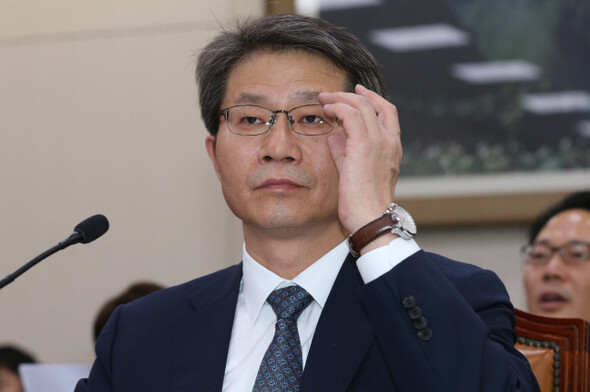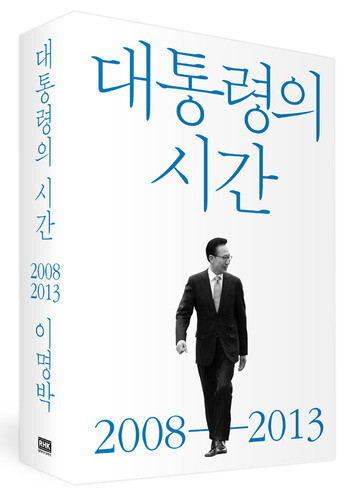hankyoreh
Links to other country sites 다른 나라 사이트 링크
Unification Minister says sanctions on North could be lifted if dialogue takes place

Unification Ministry Ryoo Kihl-jae said on Feb. 6 that South Korean sanctions against North Korea could be lifted if the two sides have dialogue.
Analysts read the remarks as signaling a more open stance from the administration, which previously said it would only “discuss” lifting the so-called “May 24 measures” if Pyongyang agreed to dialogue.
“Economic cooperation isn’t happening right now because of the May 24 measures, but the administration has actually done all the studies on those measures,” Ryoo said on Feb. 6 in a lecture held at Seoul’s Ritz Carlton Hotel at the invitation of Woori Bank.
“If South Korean capital is invested after the main contract for the Rajin-Hasan project is completed, the situation with the May 24 measures starts to become very awkward,” he added.
Ryoo also said the administration was likely to be more accepting of exchange because of events related to the 70th anniversary of Korea’s liberation from Japanese colonial occupation.
“This year is the 70th anniversary of liberation, so the administration is planning to allow as much [exchange and cooperation] as possible in areas like society/culture, religion, and sports,” he explained.
Another factor addressed by Ryoo was North Korea’s special economic zone development projects.
“North Korea isn’t going to come right out and say it, but there have been messages that they would appreciate South Korea’s help,” he said.
“If North Korea is pursuing economic openness, then their economy could develop very quickly with South Korean help,” he added. “We can’t do that now because of the nuclear issue.”
While insisting that North Korea’s “attitude on the nuclear issue and other issues needs to change,” Ryoo also stressed the importance of Seoul taking the initiative.
“Obviously, we have to make the first efforts to change that,” he said. “There is no objection whatsoever to the idea that we need to be act more preemptively and flexibly.”
Ryoo went on to stress the importance of dialogue.
“Even if [North and South Korea] have conflict, we still have to meet,” he said. “And I think that if we do meet, North Korea is obviously going to try some tricks and fail to keep its promises. But we still have to meet. We have to keep working to convince them to honor their promises.”

Ryoo expressed unhappiness with the recent publication of memoirs by former President Lee Myung-bak containing previously undisclosed information about diplomatic efforts between Seoul and Pyongyang.
“He shouldn’t say things like that. Just because you know about them doesn’t mean you should say them,” he said.
“I actually know all about the back story behind the memoirs that President Lee Myung-bak recently wrote,” he added.
His remarks sent a stronger message than the one recently coming from the Ministry of Unification, which has previously maintained that it would be “inappropriate” to comment on the content of a former president’s memoirs. Ryoo’s open displeasure may reflect a more general current of criticism within the current Park Geun-hye administration - and the perception that Lee acted imprudently by hampering efforts to improve inter-Korean relations with the release of previously undisclosed diplomatic details.
Lee’s memoirs were previously subject to a strong denunciation in a Feb. 5 statement from North Korea’s Committee for the Peaceful Reunification of the Fatherland, which accused Lee of “slandering us and giving a skewed portrayal of behind-the-scenes meetings between North and South.”
Ryoo also voiced displeasure over the Lee administration’s attempt to merge the Unification Ministry with the Ministry of Foreign Affairs when it first took office in 2008.
“The Unification Ministry nearly disappeared in 2008,” Ryoo said. “Some staffers are suffering even now from the trauma.”
“Eighty employees at the main office lost their jobs. It makes no sense. And then to talk about ‘unification’ after that. . . ,” he continued.
“We’re the world’s only divided nation, and if we have created an exclusive agency [for that], then we should stand behind it,” he added.
By Son Won-je, staff reporter
Please direct questions or comments to [english@hani.co.kr]

Editorial・opinion
![[Guest essay] Maybe Korea’s rapid population decline is an opportunity, not a crisis [Guest essay] Maybe Korea’s rapid population decline is an opportunity, not a crisis](https://flexible.img.hani.co.kr/flexible/normal/500/300/imgdb/original/2024/0430/9417144634983596.jpg) [Guest essay] Maybe Korea’s rapid population decline is an opportunity, not a crisis
[Guest essay] Maybe Korea’s rapid population decline is an opportunity, not a crisis![[Column] Can Yoon steer diplomacy with Russia, China back on track? [Column] Can Yoon steer diplomacy with Russia, China back on track?](https://flexible.img.hani.co.kr/flexible/normal/500/300/imgdb/original/2024/0430/1617144616798244.jpg) [Column] Can Yoon steer diplomacy with Russia, China back on track?
[Column] Can Yoon steer diplomacy with Russia, China back on track?- [Column] Season 2 of special prosecutor probe may be coming to Korea soon
- [Column] Park Geun-hye déjà vu in Yoon Suk-yeol
- [Editorial] New weight of N. Korea’s nuclear threats makes dialogue all the more urgent
- [Guest essay] The real reason Korea’s new right wants to dub Rhee a founding father
- [Column] ‘Choson’: Is it time we start referring to N. Korea in its own terms?
- [Editorial] Japan’s rewriting of history with Korea has gone too far
- [Column] The president’s questionable capacity for dialogue
- [Column] Are chaebol firms just pizza pies for families to divvy up as they please?
Most viewed articles
- 1First meeting between Yoon, Lee in 2 years ends without compromise or agreement
- 2Under conservative chief, Korea’s TRC brands teenage wartime massacre victims as traitors
- 3Months and months of overdue wages are pushing migrant workers in Korea into debt
- 4[Guest essay] Maybe Korea’s rapid population decline is an opportunity, not a crisis
- 5[Column] Can Yoon steer diplomacy with Russia, China back on track?
- 6‘We must say no’: Seoul defense chief on Korean, USFK involvement in hypothetical Taiwan crisis
- 7Dermatology, plastic surgery drove record medical tourism to Korea in 2023
- 8After election rout, Yoon’s left with 3 choices for dealing with the opposition
- 9Two factors that’ll decide if Korea’s economy keeps on its upward trend
- 10[Column] Behind factional animus of Korean politics, victim mentality festers